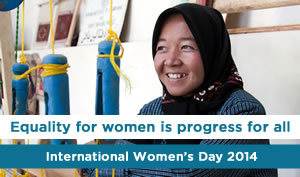OECD celebrates 2014 International Women’s Day
Revision for “OECD celebrates 2014 International Women’s Day” created on February 17, 2016 @ 14:33:16
|
OECD celebrates 2014 International Women’s Day
|

On the occasion of 2014 "International, this article presents the work that the "Organisation is doing in the field of gender equality and women’s empowerment. The <a href="http://www.oecd.org/gender/data/">OECD Gender Data Portal</a> includes selected indicators shedding light on gender inequalities in <b>education</b>, <b>employment</b> and <b>entrepreneurship</b>. While much progress has been accomplished in recent years, there are still relevant dimensions of gender inequalities that are poorly monitored and measured. The Portal is thus a work in progress, that aims at progressively filling these gaps through new indicators. The data cover OECD member countries, as well as "Gender , "Gender , "Gender , "Gender , "Gender , and "Gender . PISA 2012 results also reveal that many students, particularly girls, feel anxious about mathematics and have low levels of confidence in their own abilities. Even among girls and boys who perform equally well, girls are more likely to feel anxious towards mathematics, and have less confidence in their own mathematical skills and in their ability to solve mathematics problems than boys. Gender gaps in motivation and self-beliefs are particularly troubling because these factors are essential if students are to achieve at the highest levels and because they have long-lasting consequences on students’ educational and career decisions. In 2011, an average of only 14% of women entering university-level education enrolled in science-related fields (which include science and engineering) or in manufacturing and construction, compared to 39% of men who entered this level of education in these fields. <b>Read more:</b> Yet, general government is characterized by many of the gender gaps found elsewhere in the labour market. Women make up a disproportionate share of part-time employment in central government, where they represented at least two thirds of part-time workers in 2010 in the 16 OECD member countries for which data was available. Women are also under-represented in leadership positions: in 2010 women held more than 50% of secretarial positions (even around 90% in "Gender and "Gender ) but only 40% of middle management and 29% of top management positions. <b>Figure 1.8 Women in top management positions compared to their share in central government, 2010</b> <a href="http://www.oecd.org/gov/oecdglobalforumonpublicgovernance.htm">The Forum</a> provided a unique opportunity to engage with leading actors from government, parliaments, justice institutions, civil society and business worldwide, to explore concrete actions on the following challenges: In the context of the OECD Gender Initiative, launched by the OECD Ministers, the OECD also prepared a report on "<b>Women in Government and Public Policies: Closing Gender Divides</b>", which was released at the 2014 OECD Global Forum. <a href="http://www.oecd.org/governance/women-government-and-policy-making.htm">This publication</a> provides comparative data and policy benchmarks on women’s access to public leadership and inclusive gender-responsive policy-making across OECD countries. Further information on the OECD Directorate for Public Governance and Territorial Development’s work on Gender equality and Women’s Leadership in the public sector may be found <a href="http://www.wikigender.org/index.php/Gender_Equality_and_Women%27s_Leadership_in_the_Public_sector">here</a> <b>Financing the unfinished business of gender equality and women’s rights: priorities for the post-2015 framework</b> Despite the upward trend in aid focused on gender equality since the MDGs, significant funding gaps remain in priority areas for the post-2015 framework – women’s economic empowerment, family planning, women, peace and security, and women’s participation and leadership. It is time to close these gaps. <b>Read more:</b> <b>Find out more on our work on social norms</b> <ul> <li> "Organisation </li> <li> "Organisation </li> </ul> <a href="http://oecd.org/development/poverty/genderatthedevelopmentcentre.htm">Find out more about gender work at the OECD Development Centre</a>! <h2 id="w_the-mena-oecd-partnership-to-support-womenaos-economic-empowerment">The MENA-OECD Partnership to support women’s economic empowerment</h2> MENA Despite progress in education and efforts by some MENA governments to support women’s development, women still face numerous challenges: women labour force participation is the lowest in the world at 24%, women unemployment is the highest worldwide at 18%, women entrepreneurship lags far behind men’s, and women have difficulty accessing high-level management positions. The <a href="http://www.oecd.org/mena/investment/womenempowerment.htm%20">OECD-MENA Investment programme</a> was created in 2005 at the request of 18 MENA governments. In 2007, MENA ministers endorsed the Declaration on Fostering Women’s Entrepreneurship in the MENA Region, and in 2009 they signed an Action Plan on Fostering Women’s Entrepreneurship and Employment in the MENA region. Since 2009, the MENA-OECD Investment programme has been leading two initiatives to mainstream women’s empowerment into the wider political debate and unlock women’s economic opportunity in the region: Ensuring that women have a voice in shaping public policy is crucial for fostering social cohesion, ensuring effective and accountable governance and building inclusive growth in MENA economies. Despite significant gains in educational equality over the past decade, MENA women remain under-represented in the economic and political spheres. Women have played a key role in recent uprisings in the region, which could both accelerate or jeopardise progress made in enhancing women’s participation in the economic, political and social spheres. Recent political events can provide an excellent opportunity for women to play a greater part in the political process. The upcoming 2014 OECD-CAWTAR Report on Gender, Law and Public Policy: Trends in the Middle East and North Africa region. The report will: <i>"Let me first underline that, besides the tremendous progress we could observe in the last 50 years, there is still a long way to go to achieve real gender equality. Gender is maybe the most underexploited resource for the economy and the society nowadays. This is true for many countries – also at different stages of development. We have not achieved equality, the gap is still wide. Opportunities for women are not equal in education, neither in the labour market, nor in entrepreneurship, or politics. This is a waste for the individuals, but is also an obstacle to realize the full potential of our economies. We need to change this. This is a major an economic imperative. There is an economic and a business case for it. To face the daunting economic challenges of today, we need to tap all sources of growth. We can not waste women’s economic contributions. This is why the OECD has embarked in developing a gender initiative that covers education, employment and entrepreneurship."</i> Angel Gurría, OECD Secretary-General (Chicago, 8 March 2012)See International Women’s Day OECD page: http://www.oecd.org/gender/theoecdgenderbrowserabenchmarkforgenderequality.htm |



 In the framework of the MENA-OECD Governance Programme, there has been a strong call from civil society organisations, policy makers and governments to use the existing MENA-OECD Women in Government Platform to lend support to women in the region. The MENA-OECD Women in Government Platform, in collaboration with the international community, can help ensure that MENA women have a voice in the policy dialogue and access to international policy fora, networks and resources. Given the dearth of internationally comparable data on MENA economies, the programme makes an important contribution by disseminating good practices and sharing concrete, innovative and timely solutions with stakeholders from the region. The MENA-OECD Women in Government Platform is well positioned to respond to these critical needs while leveraging the continuity of its established network.
In the framework of the MENA-OECD Governance Programme, there has been a strong call from civil society organisations, policy makers and governments to use the existing MENA-OECD Women in Government Platform to lend support to women in the region. The MENA-OECD Women in Government Platform, in collaboration with the international community, can help ensure that MENA women have a voice in the policy dialogue and access to international policy fora, networks and resources. Given the dearth of internationally comparable data on MENA economies, the programme makes an important contribution by disseminating good practices and sharing concrete, innovative and timely solutions with stakeholders from the region. The MENA-OECD Women in Government Platform is well positioned to respond to these critical needs while leveraging the continuity of its established network.